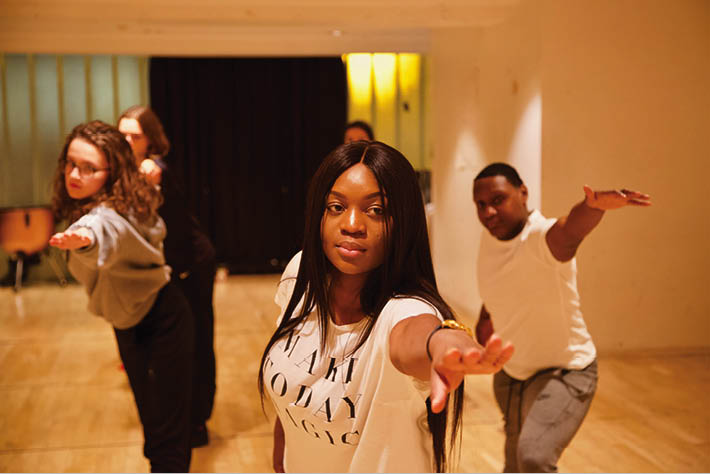The Lyric Hammersmith has extended its education outreach work. Susan Elkin went along to find out more.
It was a good day for education, learning and local people when in 2015, Lyric Hammersmith opened its magnificent, spacious two storey Reuben Foundation Wing. It runs over the street level buildings along King Street adjacent to the Victorian theatre which nestles inside newer extensions.
And it provides masses of space for Lyric Hammersmith’s extensive education work which has parity with the Lyric’s main work. The £20 million Reuben Foundation Wing includes drama, dance and recording studios, an editing suite, music practice rooms, a film & TV studio, a screening room, a digital playspace, a sensory space for children with disabilities, props and costume stores, wardrobe and scenic workshops, meeting and seminar rooms, staff offices and social spaces. The mission statement on the website says it all: “We are committed to producing the highest quality contemporary theatre, alongside nurturing the creativity of young people.”
Nicholai La Barrie, director of young people, has an impressive number of programmes in place along with other local links such as housing the tri-borough music hub and youth orchestra which draws members from three local boroughs (Hammersmith & Fulham, Kensington & Chelsea and Westminster) and an annual festival, a long time partnership with all the special schools in the tri-borough area, now in its third year.
“About 250 to 300 kids take part in Ruben Wing activities such as drama and youth theatre every week” says Nicholai. “And we run whole weeks during half terms and other holidays too.”
The Lyric’s “targeted” programmes aim to bring marginalised young people into open access. “We don’t allow labels or stigma, though, and there’s a really good mix in every class. We have a slight weighting towards disadvantaged participants such as those referred by schools, pupil referral units, looked after children and so on.” He continues: “For instance our Rewind scheme rewards them with Friday at the Lyric if they attend school from Monday to Thursday. It acts as a trigger to help keep them in education or coax them back and in most cases, everything improves including behaviour and school work.”
Then there’s the Lyric’s Start programme, a six-week confidence boosting course for 16-25-year olds not in education, employment or training (NEET). “They are referred by agencies” explains Nicholai and they learn life changing skills such as how to turn up and co-operate as well as having the satisfaction of creating a piece of work to share at the end of the course.”
It isn’t every day, either, that I discover a strong new vocational training opportunity which is almost free to the participants. I refer to the Lyric Ensemble – the icing on the cake – which piloted in the 2017/18 academic year and started work with its second group last term.
Fifteen young actors, aged 18-25 are recruited to form an ensemble; Nicholai tells me he auditioned 80 last autumn for the new 2018/19 cohort. “They include writers, actors, film makers, musicians, people who are interested in directing or producing” he says. “It’s a very rich mix of talent and our catchphrase is ‘training to perform’”.
The idea is to find people with real potential who haven’t accessed training before and aren’t likely to. “It’s a way of opening up the industry to young people who are prevented from going to drama school by perceived or actual barriers” Nicholai explains.
Some of the fifteen are supported by bursaries but even full fees are very low. “Right across the education and learning work we do here the average fee is £4.00 a session” observes Executive Director, Sian Alexander, as the three of us sip tea in the Lyric’s rather nice café area.
The 15 ensemble members come to the Lyric two evenings per week for nine months at the end of which they create a studio show. Along the way they also take part in intensive weeks of training.
“And of course, we keep an eye on production values, standards and rigour” Nicholai adds, explaining that last year there was a lot of focus on, for example, movement, improvisation, text and character. “What they do has got to be good. We’re a professional theatre”.
Casting directors came to last summer’s shows. Nicholai assures me happily that each individual actor “shaped up” and that almost all got some sort of industry representation at the end of the course. “They were snapped up” he says. And that, obviously, is the acid test. Without an agent your chances of getting professional work are infinitesimal.
The groups are gloriously diverse and inclusive. They include people – often from youth theatres – of all ethnic and economic backgrounds as well as LBGT and people with disabilities.
Lyric Hammersmith will be enrolling its 2019/20 ensemble group in September next year. Some applicants will, predictably, already be Lyric Hammersmith members. But it’s open to all.
The size of the building and the scope of the work – I’m mentioning only a few examples here – is deeply impressive. “Yes” says Nicholai. “The Ruben Wing is often compared to a TARDIS and we think that’s an apt metaphor for the work which goes on inside it.”
www.lyric.co.uk



